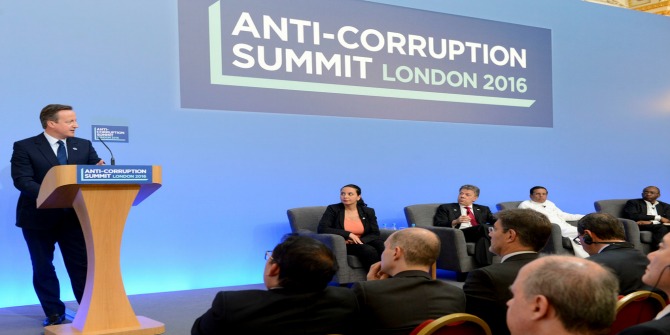 David Cameron’s government frequently emphasised the need to tackle corruption, both within the UK and abroad. Daniel Hough assesses how this picture is likely to change following Britain’s decision to leave the EU and the appointment of Theresa May as Prime Minister. He writes that with Brexit posing a number of challenges for May’s government, there is a danger that the issue of tackling corruption slips off the political agenda.
David Cameron’s government frequently emphasised the need to tackle corruption, both within the UK and abroad. Daniel Hough assesses how this picture is likely to change following Britain’s decision to leave the EU and the appointment of Theresa May as Prime Minister. He writes that with Brexit posing a number of challenges for May’s government, there is a danger that the issue of tackling corruption slips off the political agenda.
“The future” as the unfortunate wordsmith Dan Quayle once noted “will be better tomorrow”. Those who advocated for the UK to leave the European Union may well be doing their best to delay tomorrow for a while longer, but the chances are that it will indeed arrive eventually. At some point over the next few years Britain will leave the EU and a whole host of open questions will (in one way or another) be answered.
Given the immensity of the challenge of renegotiating Britain’s relationship with the EU and its soon-to-be 27 member states, issues of corruption and anti-corruption have (perhaps understandably) been relatively low down the public pecking order. The European Union has developed an array of impressive sounding anti-corruption initiatives (see here for example), but generating substantive policy change has proven difficult. Negotiators, one might assume, will subsequently be concentrating their energies on potentially more high-profile areas such as trade and migration.
That, however, does not mean that anti-corruption will be a non-issue in terms of Brexit. Organisations such as Transparency International UK (TI) and Corruption Watch UK (CWUK), as well as a variety of informed bloggers (see here for a particularly interesting blog on Brexit and anti-corruption by former TI activist Rebecca Dobson), have already pointed out that Brexit poses a real threat to much of the anti-corruption progress made in recent years. Theresa May and her new government could conceivably put that progress on the line not so much by actively looking to mitigate against previous gains, but through a process of benign neglect. That’s something that the UK’s anti-corruption community need to keep a very sharp eye on.
David Cameron’s anti-corruption legacy
One of the reasons behind this is personal. During the course of his premiership David Cameron regularly stressed that the UK needed to rise to the challenge of tackling corruption. Cameron gave a number of high profile speeches on the matter, he took significant steps towards bringing in important new legislation and the UK now has its first anti-corruption plan. The UK government is also committed to publishing “a new strategy” on anti-corruption in November 2016 and last but not least David Cameron also recently hosted a high-profile global anti-corruption summit.
Cameron subsequently changed the tone of the debate in the UK, arguing that corruption wasn’t simply something that happened in other places. Over time he made a strong case not just for helping others tackle their corruption problems, but also for the UK itself to lead the way by looking at where it could do better. This prompted Transparency International UK’s Executive Director, Robert Barrington, to go as far as to claim that Cameron and his government have done more for the anti-corruption cause than any of their predecessors since World War II.
David Cameron’s resignation subsequently poses a number of questions about where Britain’s anti-corruption thinking goes next. Will Theresa May’s government give anti-corruption the same priority that David Cameron’s did? It hasn’t taken long for CWUK to worry out loud that the challenge of dealing with potentially all-encompassing Brexit negotiations will see anti-corruption inevitably slip down the government’s priority list (see here for more on this).
What next?
So what of Theresa May? On the plus side there is evidence that she is not scared to act when she sees a potential corruption challenge. As Home Secretary, for example, she tried to shake up the police by expanding the resources of the Independent Police Complaints Commission (IPCC). This she did specifically to try and help the IPCC clamp down on police corruption, and, as the Guardian noted at the time, “the transfer of resources from internal police standards units to the IPCC forms a crucial part of a new package of measures to boost police integrity”.
There are, however, warning signs. CWUK and TI have both asked whether an economic downturn could put renewed pressure on the resources allocated to the Serious Fraud Office (SFO) and other corruption-fighting institutions. May has certainly long been critical of the work of the SFO, and rumours that she wanted to abolish it altogether have rarely been far from the surface (see here and here for evidence of this from 2011 and 2014). The bundling of anti-corruption organisations such as the Overseas Anti-Corruption Unit (OACU) and the Metropolitan Police’s Proceeds of Corruption Unit (PoCU) in to the International Corruption Unit (ICU) in 2015 may sound like a sensible bit of streamlining, but the move to become a part of the National Crime Agency (NCA) – another May creation – was not without internal controversy.
Controversy, of course, need not necessarily be a bad thing. Institutional reform inevitably brings with it both winners and losers. But the creation of the NCA, and the incorporation of the UK’s anti-corruption activities within it, did give a strong indication as to where May’s priorities may lie; if corruption is framed as a security challenge, then May’s record would seem to indicate that it will remain at the forefront of her thinking. Corruption clearly does assist those involved in organised crime (another security threat), and May is certainly keen to ensure that joined up thinking – as evidenced by the housing of a host of previously autonomous bodies under one roof in the NCA – gives the UK authorities greater opportunity to track down those involved in such activities.
But corruption is about much more than (just) security. And here is where things begin to look a little bleak. The Department for International Development (DfID) is certainly likely to be looking nervously over its shoulder. Much of the UK’s on the ground anti-corruption work is channelled through DfID, a department that the new Secretary of State for Development Priti Patel once wanted (as recently as 2013) to abolish.
Indeed, Patel’s claim that DfID should concentrate much more on furthering trade relationships and embracing the power of markets to alleviate poverty may be emblematic of the direction that May’s government ultimately takes. Add in the fact that David Cameron made a point of protecting DfID’s budget from austerity-inspired cuts, and there is already a feeling that DfID may be in for a rough ride. That really does not bode well for any policy-makers hoping that anti-corruption in a broader sense might be at the centre of the government’s thinking.
The economics of anti-corruption
Alongside attitudes to DfID, it’s in areas such as trade and economic renewal where we should perhaps be most sceptical as to how committed the new government will be to the Cameron agenda of leading from the front. The UK has arguably the most powerful and widely respected piece of anti-bribery legislation in the world. The UK Bribery Act came into force in 2010. It applies not just to companies doing business in the UK but also to UK-based companies doing business all over the world.
Despite the fact that there have been only a handful of convictions (and the first of these were all decidedly small fry), parts of the UK business world have always felt that the Act was an onerous cost on their business activities (see here and here for example). It, so they tended to argue, put extra (and excessive) administrative and bureaucratic burdens on them. In a setting where the UK economy sails in to choppier waters, there is likely to be strong behind the scenes lobbying for the Act to be watered down.
This is truer still when one considers that Brexiters are never shy in stressing how the UK, freed from the apparent shackles placed on it by the EU, will be able to do more business with developing markets. They have their eyes not just on Commonwealth countries such as India, but also on Brazil and particularly China. Boris Johnson was certainly apt at lobbying for business in China whilst mayor of London, and it is likely that he’ll continue in the same vein as foreign minister.
However, a look at any of the international corruption indices (see for example here and here) will illustrate that the corruption challenges in these markets may well be considerable. Given this, and as TI UK has already noted, UK business may feel – even if it is reluctant to say so too loudly in public – that by being forced to compel with the UKBA it is not just these companies that could be losing out on business, the Act will be acting as a major hindrance to helping the UK economy bounce back from its Brexit shock. When governments have elections to win such arguments can be persuasive.
The proof of the pudding
Theresa May’s administration undoubtedly faces a set of unique challenges. Given the high profile nature of many of these it would be understandable if tackling corruption was not at the top of her hit-list. And there will be voices that will argue that in challenging times anti-corruption is a fair weather issue.
In reality, this argument makes little sense. It was a post-financial-crisis UK Prime Minister that set the tone for some impressive anti-corruption thinking, illustrating that fighting graft and fostering economic development need not be polar opposites. Indeed, the key message from the Cameron era is that good business behaviour can and should be seen as a unique selling point in and of itself. Whether Theresa May’s administration will buy into that thinking remains, now at least, a much more moot point.
_____
Note: This article was first published on EUROPP – European Politics and Policy.
 Daniel Hough is Professor of Politics at the University of Sussex. In his role as Director of the Sussex Centre for the Study of Corruption (SCSC) Daniel regularly works with and advises practitioners in the anti-corruption community. He is also currently serving as the Chairman of the International Association for the Study of German Politics.
Daniel Hough is Professor of Politics at the University of Sussex. In his role as Director of the Sussex Centre for the Study of Corruption (SCSC) Daniel regularly works with and advises practitioners in the anti-corruption community. He is also currently serving as the Chairman of the International Association for the Study of German Politics.








